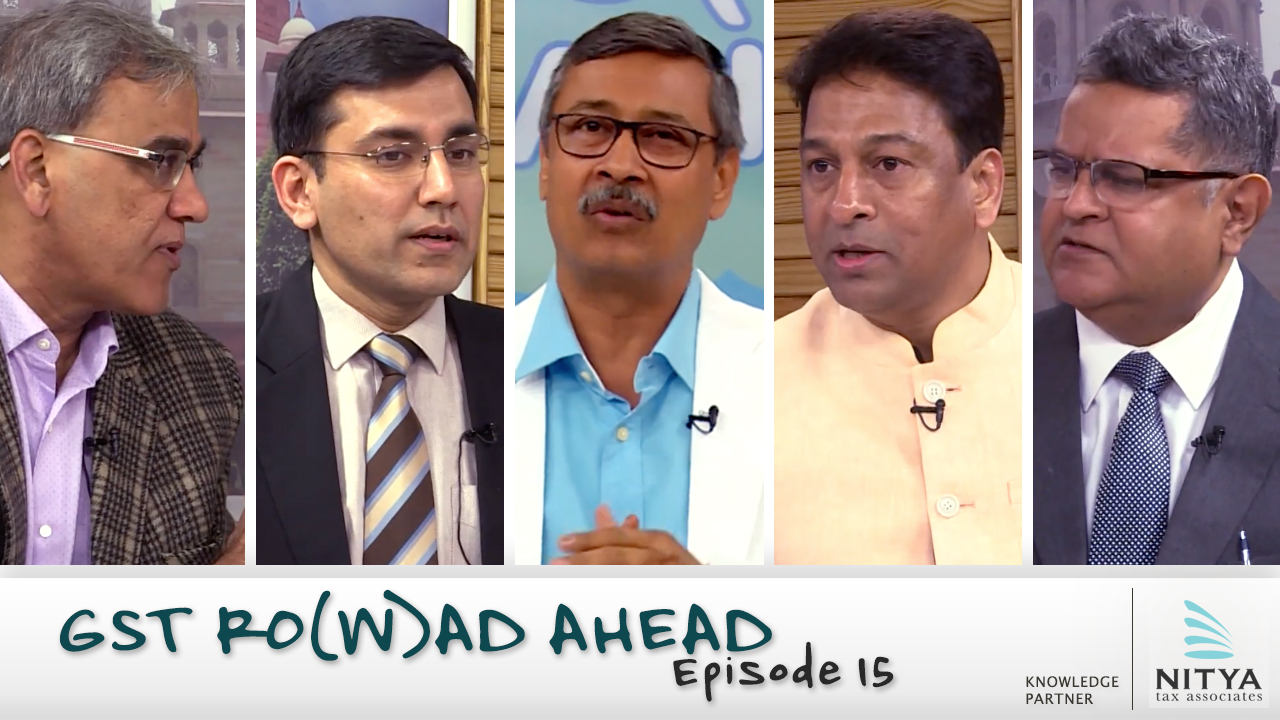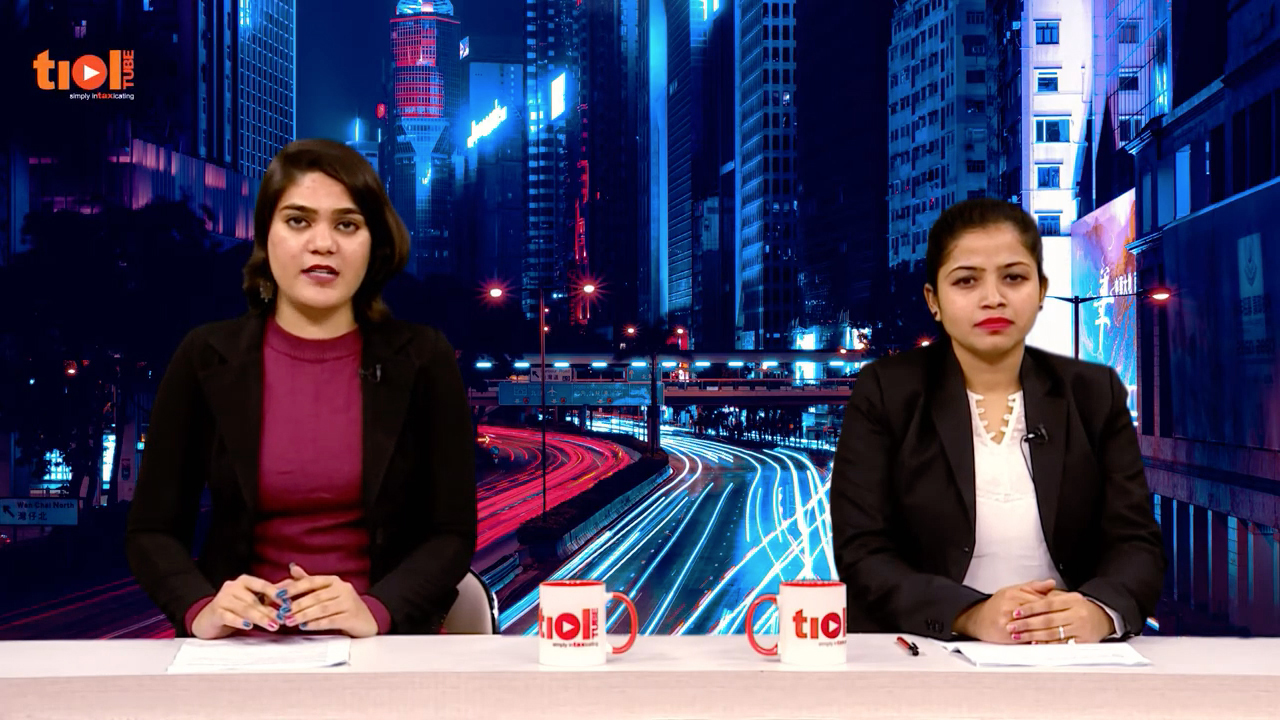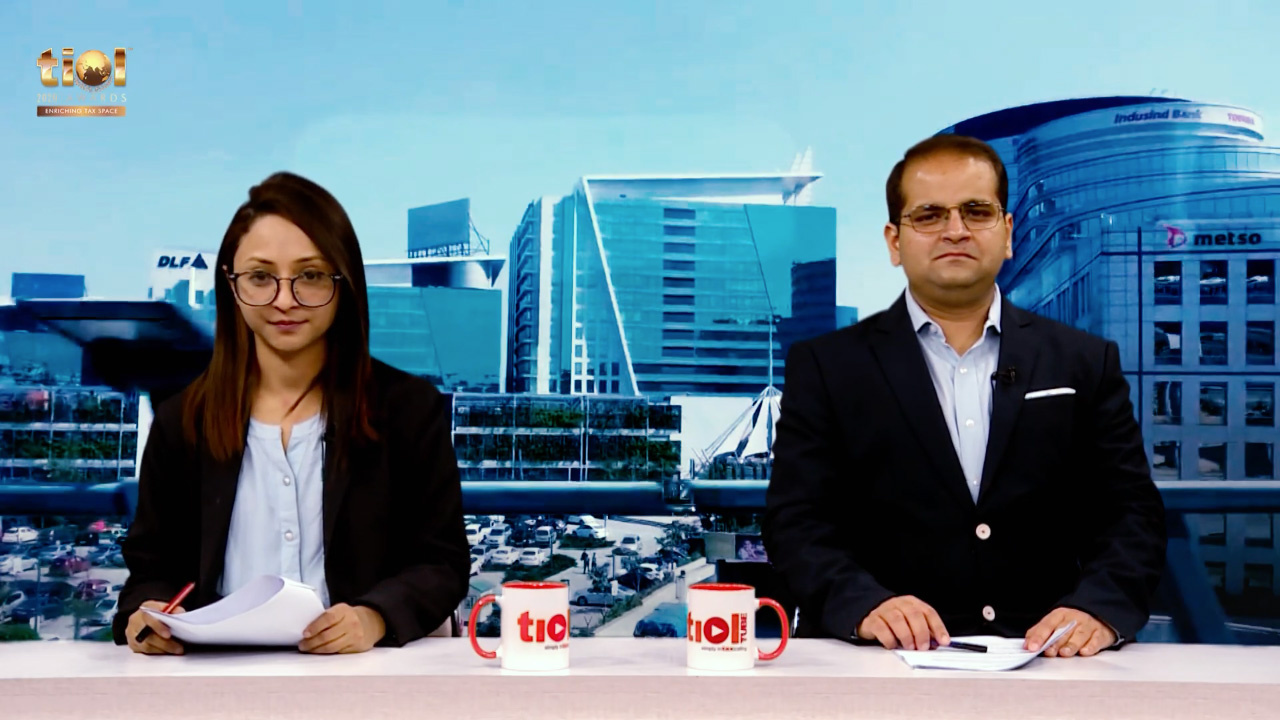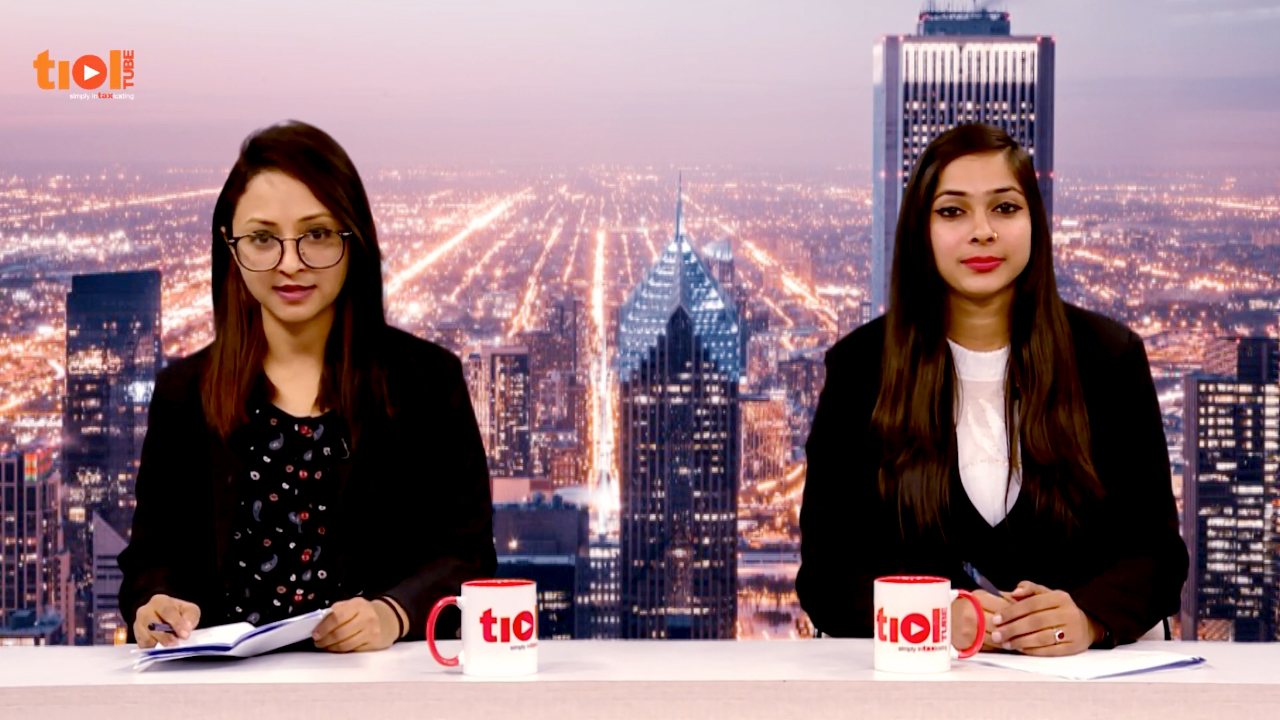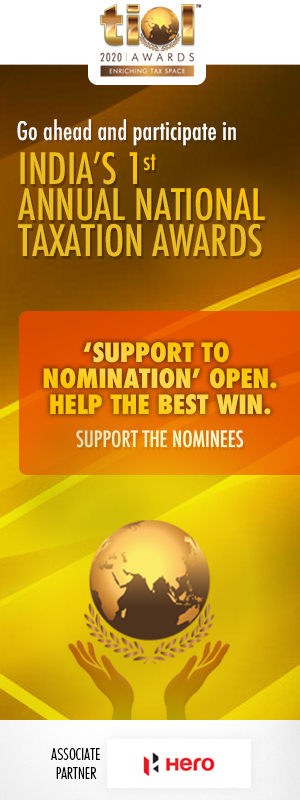|
SERVICE TAX
2020-TIOL-657-HC-MAD-ST
Perundurai Common Effluent Treatment Plant Vs CC & CE
ST - The petitioner has challenged the SCN dated 8.9.2010 of the respondent wherein it has been alleged that the petitioner was rendering services of "clubs or association" as defined in section 65 (25a) of the Finance Act, 1994 - it has also been alleged that the petitioner, being an incorporated company, the services rendered by it cannot be said to be excluded from the definition of "club or association" in view of specific exclusion in sub- clause (iii) to the above definition - ST demanded, penalty provisions invoked - Petition before High Court.
Held: Counsel for both sides fairly submitted that the issue is no longer res integra, in light of the latest decision of the Supreme Court in the case of State of West Bengal Vs. Calcutta Club Ltd. - 2019-TIOL-449-SC-ST-LB - normally, a writ against SCN ought not to have been entertained at the first instance and the petitioner ought to have been directed to reply to the said SCN - however, in the present writ petition, an interim injunction was ordered on 16.11.2010 and, therefore, the impugned SCN has not been adjudicated till date - meanwhile, the Supreme Court has given its verdict on 3.10.2019 in the case of State of West Bengal Vs. Calcutta Club Ltd. (supra) and the question of law has now been settled - in the light of the proposition by the Supreme Court [in paragraphs 72, 73, 82, 83 and 84], it is evident that the proposed demand in the impugned SCN can no longer be sustained - therefore, this Writ petition is allowed by setting aside the order impugned herein: HIGH COURT [para 3, 6, 7, 8]
- Writ Petition allowed: MADRAS HIGH COURT
2020-TIOL-512-CESTAT-MAD
TVS Finances And Services Ltd Vs CCE
ST - Appellant is providing financial services and gives loans - For recovery of loans, appellant collects post-dated cheques - There are instances when post-dated cheques after being presented to bank get dishonoured - The bank collects charges for dishonouring of the cheques and such charges are recovered by the appellant from their clients - Revenue is of the view that such charges should be included in the assessable value for levy of service tax - For the period Sept.'04 to Jun.'09, demand raised and confirmed by CCE, Chennai, therefore, appeal before CESTAT.
Held: There is no dispute that the amount collected by the appellant from their clients is equal to the amount that the appellant pays to the bank due to dishonouring of cheques - Therefore, said expenses are reimbursable expenses - By applying the law laid down by Supreme Court in the case of M/s. Intercontinental Consultants and Technocrats Pvt. Ltd. - 2018-TIOL-76-SC-ST Bench holds that the demand against the appellant is not sustainable - impugned order is set aside and appeal is allowed with consequential relief: CESTAT [para 4]
- Appeal allowed: CHENNAI CESTAT
CENTRAL EXCISE
2020-TIOL-658-HC-AHM-CX
CCE & ST Vs Pipavav Shipyard Ltd
CX- Question No.1 :- Whether, in the facts and circumstances of the case, the Tribunal is justified in holding that fabrication of Goliath Crane, Jib Crane, Gantry Crane, Electric Overhead Traveling (EOT) Crane, etc., which are embedded to earth can be treated as excisable goods within the meaning of Capital Goods defined in Cenvat Credit Rules, 2004 and the Cenvat Credit availed of Inputs/ Capital Goods like HR Plates, MS Flats, MS Coils, Wire Ropes, Rail, Welding Electrode and service used for fabrication of these cranes is admissible to the respondent - assessee ?
Held: The words used in the definition of the term "input" under Rule 2(k) of the CCR are extremely wide and include not only the goods such as the raw materials used directly in the final product but also the goods which are used "in relation to the manufacture of final products whether directly or indirectly" which include all goods without which the manufacture of the final product would not be possible - the respondent is right in submitting that it is impossible to manufacture or repair ships without the aforementioned cranes - therefore, the HR Plates, MS Flats, MS Coils, Wire Ropes, Rail, Welding Electrode, which are used in the fabrication of cranes, are an integral part of the manufacturing process of ships and without these goods, it is not possible to manufacture ships - therefore, the HR Plates, MS Flats, MS Coils, Wire Ropes, Rail, Welding Electrode used in the fabrication of cranes which are used for manufacturing ships, are goods used "in relation to the manufacture of final products whether directly or indirectly and whether contained in the final product or not" - in light of this, they are "inputs" and the respondent is eligible to claim the Cenvat Credit on such goods - cranes fall under Chapter 84 (Tariff Item 8426 thereof) of the First Schedule to the CETA, 1985 and are therefore, capital goods by virtue of Rule 2(a)(A)(i) of the CCR - HR Plates, MS Flats, MS Coils, Wire Ropes, Rail, Welding Electrode are components of cranes since they are used in the fabrication of cranes - these items are therefore capital goods by virtue of Rule 2(a) (A)(iii) of the CCR - thus, the aforesaid items (i.e. HR Plates, MS Flats, MS Coils, Wire Ropes, Rail, Welding Electrode) being capital goods, the cenvat credit of excise duty paid thereon cannot be denied in view of Rule 3(1) read with Rule 2(a)(A) of the CCR - the definition of "Capital Goods" as contained in Rule 2(a) of the CCR does not provide that the capital goods must not be "embedded to the earth" or that they must not be immovable property - Rule 2(a) of the CCR 2004 also does not provide that the capital goods must be excisable goods - moreover, it is absurd to suggest that HR Plates, MS Flats, MS Coils, Wire Ropes, Rail, Welding Electrode used in constructing/ fabricating cranes are not excisable goods, particularly when excise duty was paid on them and cenvat credit is sought of the same - "input service" used in the fabrication of cranes which are essential for the manufacture of ships would be covered by the wide definition of input services and hence, cenvat credit of service tax paid on such services availed by the respondent must be allowed - the Cranes being part of the factory of the respondent where the ships are manufactured and their fabrication being an activity relating to respondent's business, services used for fabrication thereof would be covered within the meaning of "input services" - hence also, cenvat credit of service tax paid on such services availed by the respondent must be allowed: High Court
- Appeals of Revenue dismissed: GUJARAT HIGH COURT
2020-TIOL-511-CESTAT-HYD
Wipro Enterprises Ltd Vs CCT
CX - Appellant has not disputed the fact that they had availed CENVAT credit twice on the same invoice and also had short paid CENVAT credit on capital goods removed after being put to use - However, they contend that they have reversed the aforesaid amounts on being brought to their notice by the department and, therefore, no penalty is imposable.
Held: There is no doubt that the appellant had wrongly availed Cenvat credit twice on the same invoice - It is not the case where one could have a doubt about the admissibility of such Cenvat credit - Evidently, nobody can legitimately claim Cenvat credit twice on one invoice - Similarly, with respect to the capital goods removed after use, appellant have reversed inadequate amount of Cenvat credit which remains undisputed - In this factual matrix, the intention is self evident and the violation of Act and Rules are undisputed, therefore, there is no infirmity in the impugned order imposing penalty under Rule 15(2) of CCR, 2004 read with section 11AC(1) of the Central Excise Act, 1944 - Impugned order is upheld and appeal is rejected: CESTAT [para 5, 6]
- Appeal rejected: HYDERABAD CESTAT
2020-TIOL-510-CESTAT-MUM
Vivilon Textile Industrial Vs CCE & ST
CX - Issue is whether the Appellants are liable to pay penalty under Rule 26 of CER, 2002.
Held: Rule 26 pre-supposes the existence of knowledge or reason to believe that the goods are liable to be confiscated under the Central Excise Act or the Rules therein - As there is no finding in the impugned order to that effect, hence the imposition of penalty on the Appellants under Rule 26 is illegal and improper - Since M/s Vivion Textiles and M/s Confidence Export are limited companies, they cannot be penalized under the provisions of Rule 26 ibid which is pari materia to Rule 209A of erstwhile CER, 1944 as held by the Larger Bench in Steel Tubes of India Ltd. - 2007-TIOL-1720-CESTAT-DEL-LB : CESTAT [para 6]
CX - Cross-examination - Tribunal vide its order dated 13.4.2012 remanded the matter back to the Adjudicating Authority with the specific direction to give a cross-examination of Shri Riyaz Siddiqui and other transporter to the appellant and thereafter pass an appropriate order after giving a reasonable opportunity of hearing to the appellant to present their case - However, the Adjudicating Authority recorded a finding that since Riyaz Sizziqui has time and again disclosed the facts in his statement, therefore, cross-examination sought will not serve any purpose and nothing new will emerge in the cross-examination when all the facts are accepted and are on record - If this is the observation of the Adjudicating Authority then one can well imagine how serious were the efforts of the Adjudicating Authority in securing the presence of the said Riyaz Siddiqui for the purpose of cross-examination - It is also apparent that no summons were issued by the Adjudicating Authority to the said Riyaz Siddiqui and only letters were issued to him - Statements given by such persons cannot be relied upon for the purpose of adjudication - principles of natural justice are violated by not producing the said witness for cross-examination to the appellant/applicant - conduct of the adjudicating authority invites strictures but Bench refrains from doing so - M/s Suhel Roadlines has been penalized mainly on the basis of the statement of its proprietor Riyaz Siddiqui - no case has been made out by Suhel Roadlines - Appellant in their Appeal No. E/89293/2018 - Appeals Nos. E/89254, 89258 & 89260/2018 are allowed with consequential relief, if any, and Appeal No. E/89293/2018 is dismissed: CESTAT [para 6, 7]
- Appeals allowed/dismissed: MUMBAI CESTAT
CUSTOMS
2020-TIOL-661-HC-MUM-CUS
CC Vs Shree Balaji Automobiles
Cus - The Revenue filed an appeal before the Tribunal against an order passed by the Commr.(A) - Such appeal was dismissed by the Tribunal - The Revenue filed the present appeal before the High Court raising grounds as to whether the Tribunal could re-open an appeal for hearing which was finally disposed off by an order previously passed by its own self - The assessee also raised the issue whether the CESTAT was vested with the power to review its own order and pass a fresh one, without any review petition having been filed.
Held - It is seen that by taking up the subject appeal for hearing, the Tribunal acted in excess of its jurisdiction - Since the appeal had already been disposed of there was no occasion for taking up such appeal for re-consideration - It is clear that the hearing of such appeal was a result of mis-communication - It is also obvious that the factum of the disposal of appeal by the earlier order was not brought to the Tribunal's notice - Hence the new orders passed are liable to be set aside and are quashed - Besides, it stands settled by the decision of the Madras High Court in C.P. Aquaculture (India) Pvt. Ltd. vs. President, CESTAT wherein it was held that the Tribunal was not vested with the power to review its own judgments - Hence the questions of law are answered in favor of the Revenue - Nonetheless, the Revenue is not precluded from taking appropriate action against the earlier order passed, considering that the matter in the present appeal is not examined on merits: HC
- Revenue's appeals allowed: BOMBAY HIGH COURT
2020-TIOL-656-HC-DEL-CUS
Wadpack Pvt Ltd Vs DGFT
Cus - Petitioner prays for directions to the respondent no.1 to condone the procedural lapse of supplying the goods to the SEZ units only under ARE-1 without Bills of Exports with respect to its Advance Authorization No.0710063364 dated 2.3.2009 as also for issuance of Redemption Certificate to the petitioner with respect to the said Advance Authorization.
Held: A reading of the provisions of Foreign Trade Policy and Handbook of Procedure would clearly show that the exemption from Policies/Procedure can be granted only in cases of genuine hardship and adverse impact on trade or in public interest, in consultation with, inter-alia, the Policy Relaxation Committee [PRC] - further, a reading of Rule 30 of the SEZ Rules, 2006 would clearly show that the Bill of Export is an essential document to be submitted for claiming discharge of export obligation under the Advance Authorization - there is no explanation as to why the petitioner supplied goods only under cover of ARE-1 and not with Bill of Export except for it being an inadvertent mistake - a market player in business for this long would be expected to comply with formalities and file all relevant documents timely - exemption from following policy/procedure is not applicable for cases where the exporters, even bonafide, are not vigilant or are lax in compliance with the mandatory conditions - the onus cannot be shifted to the Authorities in such cases to retrospectively determine if the petitioner had otherwise complied with all conditions of Advance Authorization - as held by this Court in Holoflex Limited and Anr. - 2019-TIOL-500-HC-DEL-CUS, filing of Bill of Export is not a mere formality but serves as a valuable check for ensuring that the goods deemed to have been exported are in fact received by the SEZ unit and are accounted as Deemed Exports - these goods, if they are to be claimed for export entitlement, are put to scrutiny by the Authorized Officer before they are allowed entry into the SEZ - the claim of the petitioner could not have been taken on its face value - the PRC had earlier rejected the claim of the petitioner vide its communication dated 17.12.2013 - the PRC has again rejected the claim of the petitioner by the Impugned Decision taken in the meeting held on 2.2.2016, observing that the certificate issued by the Superintendent, Central Excise cannot substitute documents prescribed in ANF-4F as it does not prove that duty free imported goods were consumed in the resultant products supplied to the SEZ Unit - as held by this Court in Shashi Cables Ltd. - 2018-TIOL-2125-HC-DEL-CUS, unless such decision of the PRC is found to be perverse, arbitrary, capricious or unreasonable or otherwise contrary to the statutory framework, no interference with the such decision is permissible in exercise of power of judicial review - in the present case, no such infirmity is found with the decision of the PRC - in view of the above, no merit found in the present petition and same is dismissed: HIGH COURT [para 17, 20, 21, 22, 23, 24, 25, 26]
- Petition dismissed: DELHI HIGH COURT
2020-TIOL-509-CESTAT-MUM
Rajvir Industries Ltd Vs CC
Cus - Appellants had imported 'recycled polyester staple fibre', filed Bills of Entry and paid the duties - on knowing that the imported goods are eligible for exemption from payment of CVD under Sl. No. 172A of Notification No.12/2012-CE dated 17.3.2012 as amended by 24/2012-CE dated 8.5.2012, appellants filed 3 refund claims before the jurisdictional officer - the adjudicating authority rejected the refund claims as not maintainable on the sole ground that the appellant had not challenged the assessment orders in appeals -the appellate authority upheld the findings of the adjudicating authority - Appeal C/41284/2014 is filed against rejection of refund on the ground that the appellant has not sought for re-assessment of the Bill of Entry -by abundant caution, the appellants have then requested for reassessment and also challenged the order of rejection of refund by filing the above appeal before the Tribunal -the request for re-assessment was rejected by the department stating that the goods are not available for testing and also that the appellants have not challenged self-assessment within the period prescribed by law - appeal to CESTAT.
Held: Relying upon the judgment of the Supreme Court in the case of ITC Ltd. - 2019-TIOL-418-SC-CUS-LB, it is found that these appeals are devoid of merit -the impugned orders are upheld and the appeals filed by the appellants are dismissed: CESTAT [para 5]
- Appeals dismissed: MUMBAI CESTAT
|
|



